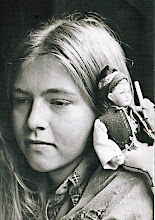These cards were sent in June and July, so I imagine the clothes were hung on the clothesline and came back smelling of sunshine. I hang laundry out in the summer too, but I would miss the convenience of a dryer in the winter.
The first card was sent to Mrs. Claude Light of Harpursville, New York in 1909. According to the 1910 Census, Claude (27) was a milk inspector for Borden Milk. His wife Nina, was 19 at the time.
The message reads:
We arrived home soon after eight. B.G. was surprised. Suppose you are canning. I washed today. I asked father how he was feeling today and he said he didn't know. Mother G. invited me up to dinner today. Write soon Lovingly M.
The second card was sent to Mr. Derrick Osro Steere of McDonough, New York in 1912. According to the 1880 Census, Derrick Steere, a dairy farmer, was born in 1855. The sender, his daughter Nora, was born in 1879. The message (with very little punctuation) reads:
June 3, 1912
Hallo Father
I send this wishing you a happy birthday and many more to come we age well F' has got to Point I have washed I have got five turkeys is all when does yours come off I will write more and send to marrow so you will have all the news
your daughter Nora
Here are the other sides of the cards. Grace Lester must have had the first one glued in an album.





















Very nice postcard this "Empire winger" and technically interesting machine.
ReplyDeleteI have been wondering recently how they ever managed to get washing dry in the winter! I know they used to have those lines that could be pulled up and which hung over hearths, and I suppose if you were rich, then drying the laundry was someone else's job/problem. I imagine the Empire Wringer would have come in pretty handy.
ReplyDelete"With the Empire Wringer I can work and talk at the same time"...Little did she know that she was one of the first turn of the century multi-taskers! :D
ReplyDeleteWe had a wringer washer in the house when I was a kid, my recollection is that it was alot more strenuous to use than she makes it look on the card- just a bit of suggestive false advertising, I guess. Of course, I was more interested in trying to get my younger brother to run his hand thru it...
ReplyDeleteAhhh! Aren't modern conveniences grand? I'm afraid we too often take for granted all the conveniences we have today.
ReplyDeleteYour blog is so fun! Amongst my grandparents' scrapbooks and photo albums are lots of vintage postcards they collected during their travels. They were born in Brazil and immigrated to the United States in the '50s. I've posted some of their postcards on my blog and plan on posting more of their postcards in the near future.
I am off to appreciate my washing machine now!
ReplyDeleteWashing must have taken days to wash/dry/iron - no wonder Grace kept the info about the wringer. It must have been on her Wish List :-) Jo
ReplyDeleteThings hadn't moved on that much in the 50s and 60 when I was growing up. We had a wringer but Mum called it a 'mangle'. She put the clothes in after boiling them in a copper wash boiler in an outhouse. It was dreadfully hard and I remember when she got her first washing machine. It did the washing etc but she still had to put it through the wringer.
ReplyDeleteNell,
ReplyDeleteWow, that does sound like hard work.
I had to look mangler, because I always thought that a mangler was an ironing device. It turns out that the term originally referred to a wringing device and later referred to an ironing device. I always wanted one of these. You could feed the whole shirt in and it would come out pressed (in theory, anyway.)